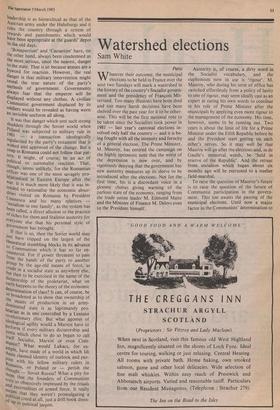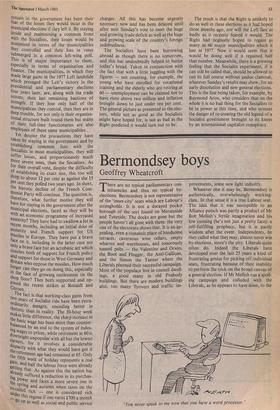Watershed elections
Sam White
Paris
Whatever their outcome, the municipal elections to be held in France over the next two Sundays will mark a watershed in the history of the country's Socialist govern- ment and the presidency of Francois Mit- terrand. Too many illusions have been shed and too many harsh decisions have been shelved over the past year for it to be other- wise. This will be the first national vote to be taken since the Socialists took power in 1981 — last year's cantonal elections in- volved only half the country — and it is be- ing fought with all the intensity and ferocity of a general election. The Prime Minister, M. Mauroy, has entered the campaign on the highly optimistic note that the worst of the depression is now over, and by vigorously denying that the government has new austerity measures up its sleeve to be introduced after the elections. Not for the first time, his is a discordant voice in a gloomy chorus giving warning of the parlous state of the economy, ranging from the trade union leader M. Edmond Maire and the Minister of Finance M. Delors even to the President himself.
Austerity is, of course, a dirty word in the Socialist vocabulary, and the euphemism now in use is 'rigour': M. Mauroy, who during his term of office has switched effortlessly from a policy of laxity to one of rigour, may seem ideally cast as an expert at eating his own words to continue in his role of Prime Minister after the municipals by applying even more rigour to the management of the economy. His time, however, seems to be running out. Two years is about the limit of life for a Prime Minister under the Fifth Republic before he and the President start getting on each other's nerves. So it may well be that Mauroy will go after the elections and, in de Gaulle's immortal words, be 'held in reserve of the Republic'. And the retreat from socialism which began about six months ago will be entrusted to a steelier field-marshal.
To raise the question of Mauroy's future is to raise the question of the future of Communist participation in the govern- ment. This too awaits the passing of the municipal elections. Until now a major factor in the Communists' determination to
remain in the government has been their i
fear of the losses they would incur n the municipal elections if they left it. By staying inside and maintaining a common front with the Socialists, their losses would be minimised in terms of the municipalities they controlled and their loss in votes submerged in a common left-wing poll. This is of major importance to them, especially in terms of organisation and finance. The municipalities, in which they made large gains in the 1977 Left landslide Which presaged the Left's victory in the Presidential and parliamentary elections four years later, are, along with the trade unions, their last remaining bastions of strength. If they lose only half of the Municipalities they control, then they are in deep trouble, for not only is their organisa- tional structure built round them but many of their full-time functionaries are also employees of these same municipalities. Yet despite the precautions they have taken by staying in the government and by establishing common lists with the Socialists in most municipalities, they will suffer losses, and proportionately much More severe ones, than the Socialists. As for their overall vote, despite the difficulty of establishing its exact size, this too will drop to about 12 per cent as against the 15 Per cent they polled two years ago. In short, the historic decline of the French Com- munist Party will continue. The question is, therefore, what further motive they will have for staying in the government after the Municipal elections, faced as they will be With an economic programme of increased austerity? They have had to swallow a lot in recent months, including an initial dose of austerity and French support for US Missiles in Europe. They have put a brave face on it, including in the latter case not Only a brave face but an acrobatic act which consists both of support for French policy and support for those in West Germany and 13ritain who oppose the missiles. How much longer can they go on doing this, especially in the face of growing restlessness on the shop floor? They both supported and op- Posed the recent strikes at Renault and Citroen. The fact is that working-class gains from two Years of Socialist rule have been extra- ordinarily meagre, sounding better in rhetoric than in reality. The 30-hour week makes little difference, the sharp increase in the basic wage has been more than counter- balanced by an end to the system of index- i,ng Wages to prices, while retirement at 60 is downright unpopular with all but the lowest earners for it involves a considerable disparity with what they would have got if the retirement age had remained at 65. Only the fifth week of holiday represents a real gain, and half the labour force were already setting that. As against this the nation has treacly suffered a reduction in its purchas- itng Power and faces a more severe one in h „ e spring and autumn when taxes on the 4o-called rich — one is considered rich under this regime if one earns £.700 a month 8° UP as well as social and public service charges. All this has become urgently necessary now and has been delayed until after next Sunday's vote to meet the huge and growing trade deficit as well as the huge and growing scale of the country's foreign indebtedness.
The Socialists have been borrowing abroad as though there is no tomorrow, and this has undoubtedly helped to butter today's bread. Taken in conjunction with the fact that with a little juggling with the figures — not counting, for example, the young who have enrolled for vocational training and the elderly who are retiring at 60 — unemployment can be claimed not to have risen above two million and inflation brought down to just under ten per cent. The general picture as presented to the elec- tors, while not as good as the Socialists might have hoped for, is not as bad as the Right predicted it would turn out to be. The result is that the Right is unlikely to do as well in these elections as it had hoped three months ago, nor will the Left fare as badly as it recently feared it would. The Right had orginally hoped to regain as many as 60 major municipalities which it lost in 1977. Now it would seem that it would be doing well if it regained half that number. Meanwhile, there is a growing feeling that the Socialist experiment, if it can still be called that, should be allowed to run its full course without undue clamour, whatever Sunday's results may show, for an early dissolution and new general elections. This is the line being taken, for example, by Raymond Aron, who considers that on the whole it is no bad thing for the Socialists to be in power at this time, and who stresses the danger of re-creating the old legend of a Socialist government brought to its knees by an international capitalist conspiracy.















































 Previous page
Previous page